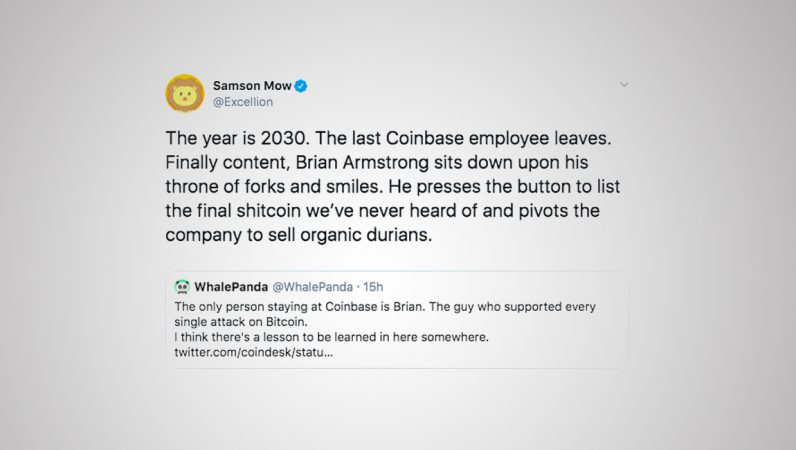2020-2-18 13:10 |
Blockstream’s Samson Mow was fairly quiet during the panel “Proof-of-Work, Halving and the Future of Mining” on day two of CoinMarketCap’s The Capital conference. Watch the live panel session in the video, or read the exclusive backstage interview!
Proof-of-Work, Halving and The Future of Mining The Capital: Is there anything that you didn’t get to talk with on this panel that you felt you wanted to be covered on the type of panel?Samson Mow: I mean, we didn’t get to go into depth on all of the stuff. There were too many deep topics that we can’t cover between four people in 40 minutes. ASIC [application-specific integrated circuit] resistance was one thing. I didn’t really chime in because I thought if I chimed in, it would run way over the time limit.
It’s a really nuanced topic and I think it’s more relevant, I guess, to altcoins then to Bitcoin, because Bitcoin is obviously not ASIC resistant. There’s lots of ASICs, but it’s reached a point where I think it doesn’t really matter anymore because ASICs have kind of become commoditized. So the efficiencies of the different manufacturers — they’re getting close. Every new gen that comes out, they’re more or less in line, there’s no one clearly in the lead.
There are big companies and a lot of them are going to become public. But having that out there in the space is actually good. And it kind of levels off the playing field overall. But for altcoins, ASIC resistance is a thing that they have to contend with and think about because there’s much less security involved for your typical altcoin.
Even something like Ethereum has to think about “should we do ASIC resistance or not?” But when you’re fighting against ASIC resistance, there’s a whole other can of worms that you’re opening up, which is you might have two companies that are working on an ASIC. One is more resourced than the other one. If both of them were able to come to market on more or less even terms, it would be OK. At least there’s two players, like AMD and Intel, right?
But if one is more heavily resourced and you change the algorithm, they have to both start from zero again. But the better resourced company will obviously have more advantages so they can come to market faster. And what that means is you end up with hidden ASICs. They don’t release them to the public. They’re either self mining or selling it to customers that they’re close to.
So I think that was the case for Ethereum. People thought there were no ASICs for Ethereum, but there were actually ASICs for Ethereum running quietly and you can see that as their hash rate went up for some time and then later on they were released.
But people inside knew that there were Ethereum ASICs. That’s the kind of thing you have to contend with if you’re a smaller altcoin.
The Capital: At the end of the panel you discussed whether proof-of-stake would ever be a threat to proof-of-work coins.Mow: So I touched on it briefly.
I just said proof-of-stake is a joke. But people haven’t gotten the joke yet.
And I think it has to do with a lot of the complexity of this industry. It’s based on cryptography and computer science and math. And that is not something average people fully understand.
But if you talk to any serious computer science person, they will tell you that proof-of-stake doesn’t really work because it is essentially perpetual energy.
So, take the analogy that proof-of-work is a pot and you have a gold ring. That’s Bitcoin, right? You put it in the pot of water and you apply energy. You boil the water and someone’s not going to reach in and steal your gold ring because they’ll burn their head. So that is protecting the valuable asset.
Whereas proof-of-stake is more like “we’re not going to steal it because people have kind of agreed and we all have an invested interest in keeping it there.” And they built these very, very complex Rube Goldberg systems that kind of mask what they’re actually doing, which is really just that everyone is supposed to be honest.
Because proof-of-work is energy, proof-of-stake is no energy. You cannot have an equivalence between them. Consuming energy is consuming energy, end of sentence. Not consuming energy to produce security is simply not producing security. That’s it.
And for coins that want to transition from proof-of-work to proof-of-stake — it’s also not really practical.
So if you take that same pot of water example for Ethereum and say “we want to go to proof-of-stake” — and they’ve been saying that for years and t’s never materialized — what they’re saying is “we’re going to build a contraption to cut the steam and then shut off the power to the pot of water and the steam is going to come back and we’re going to convert it back to heat it again.”
But as we know, there’s this thing called the law of thermodynamics, which means you cannot capture that energy perfectly. So that’s why a lot of people say proof-of-stake is perpetual motion. You can’t really do that.
The Capital: According to your analogy, are you saying Ethereum needs to scale more so that they have enough people in agreement? Is that the steam?Mow: No, it doesn’t really matter. So, there’s a lot of threat modeling that you have to consider too when you’re dealing with a cryptocurrency. So proof-of-stake, it’s secure because, you know, everyone has a stake in it, but they’re ignoring external threats.
So let’s just bash on Ethereum more, hopefully, you’re not Ethereum lovers. So ConsenSys has a stake in it, Vitalik [Buterin] has his stake in it — very large stakes. And some other people have stakes in Ethereum. And that’s why it’s proof-of-stake. And it’s all good.
But what if you have a competing network? What if you have Justin Sun with Tron, who’s trying to overtake Ethereum? So he could just buy out some of the stakes and attack the network. Or a hacker. But it’s more likely a competing network would be incentivized to destroy a proof-of-stake network, because if I can destroy Ethereum then Tron goes up.
The Capital: So you’ve probably had a conversation with someone from Ethereum before. What do they say to these arguments in defense of the proof-of-stake move?Mow: I don’t think many people argue directly with Ethereum people on proof-of-stake. It’s also been said that proof-of-stake is some sort of whack-a-mole. So you identify some vulnerability and they say, “well, we’ll create a system that addresses this vulnerability” and then that system also introduces some other vulnerabilities.
So it’s basically this continuous process of making it more and more complex to hide the fact that it doesn’t consume any energy at all and says it’s secure.
The Capital: The sort of obvious thing I just want to bring up as a general reaction to your position is about energy consumption and environmental concerns. Can you speak to that? I know it’s one of those misunderstood topics.Mow: So it’s actually kind of annoying. And this is why I think proof-of-stake is very scammy, because they call it proof-of-stake. It’s kind of anchoring to proof-of-work [in its name]. Because proof-of-work came first and then proof-of-stake. So it’s like I’m calling it something similar to this so that you think it derives the same security. A lot of altcoins do that, like Bitcoin Cash. You call it Bitcoin Cash so you think it’s Bitcoin.
But it’d be better if they called it like “stake security.” And then you’d understand and you would make new assumptions because it’s not anchoring to something else. But the whole concept of it being greener is another kind of attack on proof-of-work. So the reason why it’s easy to attack proof-of-work is because Bitcoin is very transparent.
You see how much hashrate there is. You can make a direct calculation of how much energy is being spent. So it’s very, very simple. But if you look at waste and you compare it to something like proof-of-stake — yeah, of course it doesn’t really consume power, but then it has no security.
But it’s better to compare proof-of-work to something like the fiat banking system. How do you calculate how much energy that system consumes? It’s very opaque.
You have office buildings, the construction of office buildings. You have armored cars moving things from location to location. You have a network of ATMs. You have physical bank locations where they’re managing fiat, deposits, withdrawals, whatever.
And all of that consumes energy, all that has a carbon footprint. But unlike Bitcoin, you can’t directly say, OK, this times this equals how much we’re wasting. So the benefit of Bitcoin is that it’s transparent. But that transparency means we can do simple calculations to size it up. Whereas the other system, you can’t do it. Say, for gold mining. How do you know how much energy is wasted mining gold? How much pollution is generated?
And down the road, you know, I think bitcoiners will go and create their own sources of energy. You can tap into geothermal relatively cheaply. Natural gas. You can drill down and get that in Canada pretty cheaply as well.
But most mining right now is consuming renewables. So hydroelectric power is a massive chunk of what’s powering Bitcoin mining because it’s cheap and Bitcoin miners want the cheapest possible power.
This interview has been edited and condensed.
The post [Updated] Samson Mow: Proof-of-Stake Is a Joke, Backstage at The Capital appeared first on CoinMarketCap Blog.
origin »Bitcoin price in Telegram @btc_price_every_hour
First Bitcoin Capital (BITCF) на Currencies.ru
|
|








